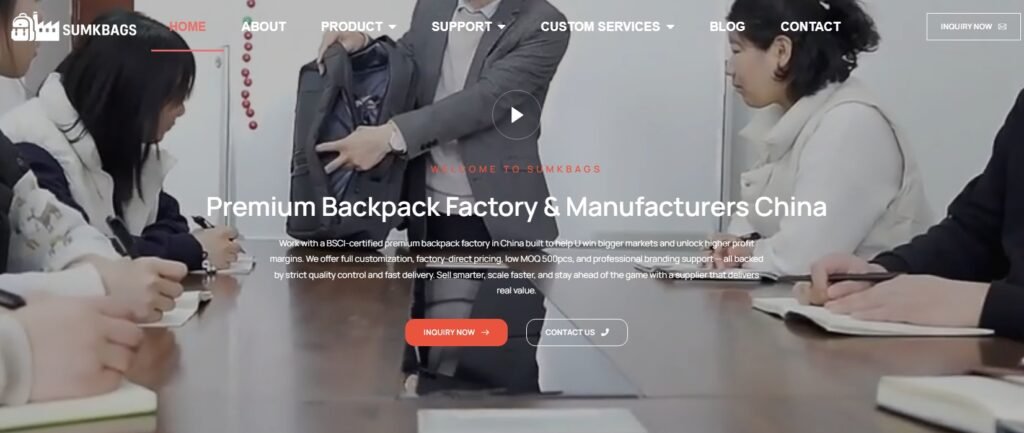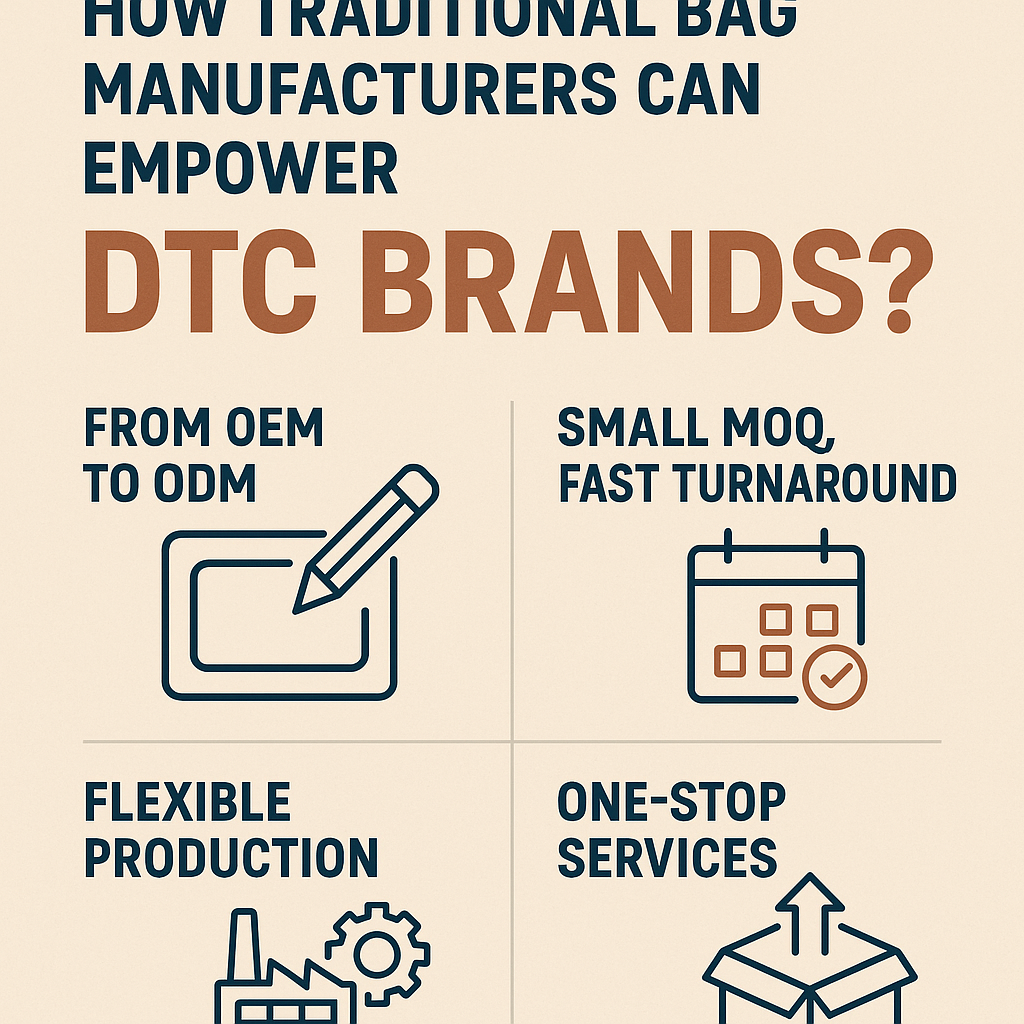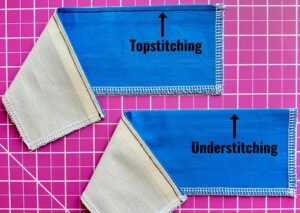- Bag OEM to ODM: not only manufacturing, but also design
- How to produce DTC products: small batches, fast response, and flexible production to suit the DTC rhythm
- From OEM to Partner: What is the DTC "One-Stop" Service?
- Conclusion: From "Made for You" to "Built with You"
- Empowering DTC Brands: What Modern Bag Manufacturers Offer
With the global rise of Direct-to-Consumer (DTC) models, an increasing number of start-up brands aim to bypass traditional retail channels and build direct relationships with consumers, Bag manufacturers should also adapt to the trend. This shift is especially visible in fashion and accessories. Bags—crucial carriers of brand identity—now sit at the core of the value chain.
Traditional bag manufacturers, once focused solely on OEM (Original Equipment Manufacturing), now face both pressure and opportunity. The path forward? Evolve into “brand enablers” by embracing ODM (Original Design Manufacturing) and comprehensive service support.
Bag OEM to ODM: not only manufacturing, but also design
In the past, Bag manufacturers mostly processed according to drawings and produced according to samples, lacking understanding of market trends and participation in design. However, in the DTC era, start-up brands often have limited resources and insufficient experience, and urgently need to quickly launch products to verify the market. This is the key to the value of the ODM (original design manufacturer) model.
Transforming into an ODM means that the factory is no longer just an executor, but also a provider of design solutions. With its deep understanding of fabrics, processes, and structures, manufacturers can provide DTC customers with an integrated solution from design proofing, material selection, to finished product adjustment – greatly shortening the product concept to market cycle.
Case: Sumkbags Located in Baoding, China, Sumkbags originally supplied OEM services to European and American clients. Recently, they built an internal design team, studied overseas consumer preferences, and introduced eco-friendly fabrics and modular product structures. By offering “template + customization” design solutions, they supported multiple niche DTC brands across Europe and the US with rapid prototyping. This collaborative ODM model transformed the factory’s role—from executor to co-creator.

How to produce DTC products: small batches, fast response, and flexible production to suit the DTC rhythm
DTC brands are characterized by strong market orientation, fast-changing demand, and low inventory tolerance. This poses a challenge to the traditional mass production-oriented manufacturing system.
At this time, flexible production lines with small MOQ (Minimum Order Quantity) and fast response capabilities have become the core of competition. A production line that can complete proofing and launch small batches within 10 days is far more popular than a traditional factory that starts at 30 days.
In order to achieve this “fast and stable” capability, some bag manufacturers have begun to introduce modular production systems, digital work order management, and even collaborate with material suppliers to ensure that efficiency and quality are maintained while switching small batch orders frequently.
This not only helps DTC brands quickly test the market and flexibly adjust SKUs, but also improves resource utilization on the manufacturing side, achieving a win-win situation.

From OEM to Partner: What is the DTC “One-Stop” Service?
True brand empowerment lies not only in manufacturing itself, but also in whether a complete ecosystem can be provided around the needs of the brand.
For many DTC brands, how to shoot products, design packaging, establish an inventory system, and achieve global distribution is often more difficult than proofing. This requires manufacturers to break the boundaries of “only production” and transform to service-oriented manufacturing.
Today, more and more bag factories are beginning to provide the following value-added services:
Packaging solutions and customized design: help brands create a unified visual system.
Product photography and short video content: support brands in social media communication.
Warehousing and dropshipping: directly package the finished products and send them to customers, saving brand operating costs.
Sample management and product data support: help brands build SKU systems and product databases.
By providing these “from creativity to delivery” solutions, manufacturers are no longer invisible OEMs, but growth accelerators behind DTC brands.
By bridging gaps across the entire go-to-market journey, such manufacturers become true partners—not just suppliers.
Conclusion: From “Made for You” to “Built with You”
DTC is reshaping how brands connect with consumers, and that shift calls for a new manufacturing mindset. Factories must move from “production” to “partnership,” from cost-cutting to co-innovation. This isn’t just about adopting new technology—it’s about owning the brand-building process.
Bag manufacturers who embrace this transformation—from OEM to brand co-founder—are paving the way for the next chapter in Asian manufacturing: one defined by quality, agility, and creative collaboration.
Frequently Asked Questions (FAQ)
Empowering DTC Brands: What Modern Bag Manufacturers Offer
Modern manufacturers are evolving from traditional OEM (Original Equipment Manufacturer) models to ODM (Original Design Manufacturer) services. They offer design support by providing ready-made templates, creating custom design solutions, and advising on materials and structure. This helps DTC (Direct-to-Consumer) brands reduce development time and accelerate product launches.
Yes. To meet the flexible needs of DTC startups, many manufacturers now support low MOQ (Minimum Order Quantity) starting from 100 to 300 units. They operate agile production lines and fast turnaround systems, enabling small batch testing, quick market feedback, and reordering without overstock risk.
Many bag manufacturers now offer one-stop solutions tailored for DTC brands. These include:
Product photography and video for social media
Custom packaging and logo design
Warehousing and dropshipping
SKU development and product database management
Such integrated services help brands focus on marketing and sales, while the manufacturer handles execution and logistics.
DTC brands prioritize speed, flexibility, and brand consistency. Service-oriented manufacturers act as strategic partners rather than just suppliers. They understand market trends, help co-create products, and enable faster go-to-market strategies. This collaborative approach is essential for today’s fast-paced, digital-first consumer landscape.



